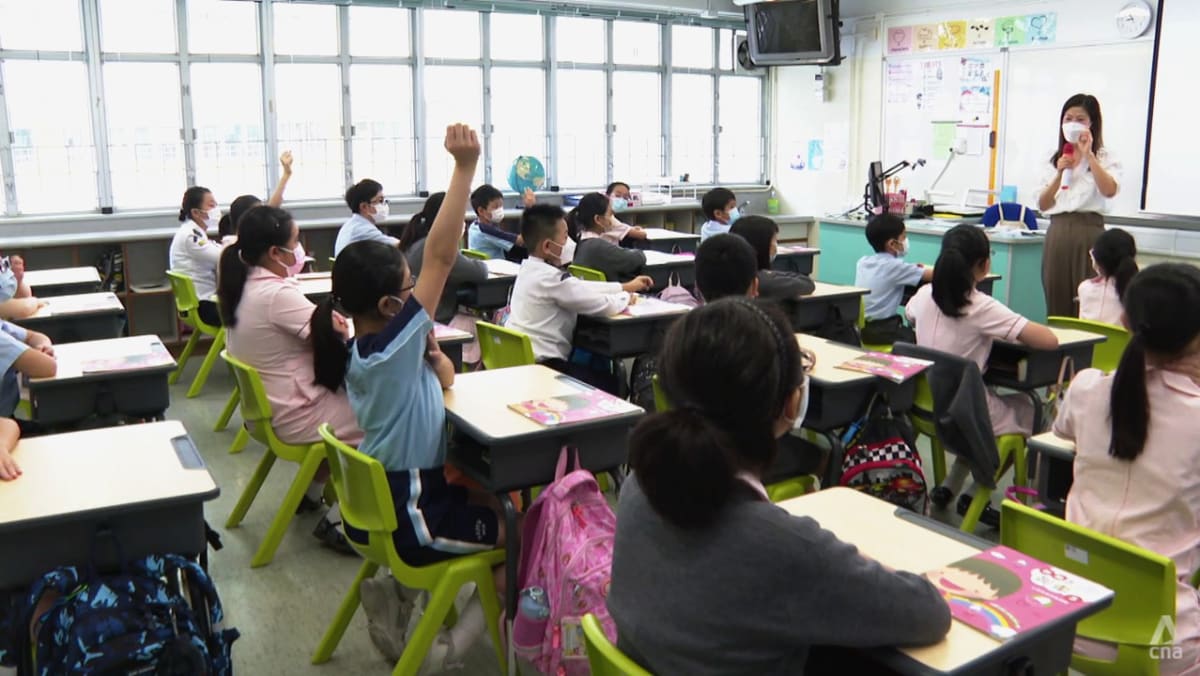HONG KONG: She had been a teacher in Hong Kong for 17 years. But a year ago, Lo Kit Ling packed her bags and left for the United Kingdom.
She was no stranger to 12-hour working days, but the load had become “abnormal” after the territory’s national security law came into force in 2020 and the COVID-19 pandemic brought on other shifts.
Lo is part of the recent wave of teachers in Hong Kong who have quit. Nearly 12,000 of them have done so since 2021, according to Education Bureau data in April.
Previously an average of about 3,600 teachers resigned or retired annually at subsidised or government-run kindergartens and primary, secondary and special needs schools, reported the South China Morning Post.
WATCH: Hong Kong’s teachers are leaving. Is the national security law behind it? (46:16)
The figure rose to 5,270 (of 73,118 teachers) in the 2020-21 school year and shot up to 6,550 (of 72,374 teachers) the following year.
While the Hong Kong Education Policy Concern Organisation — which advises the government on educational matters — stopped short of calling the resignations a crisis, chairman Mervyn Cheung acknowledged that the increase was “quite substantial”.
Bernice Chang, who recently graduated from secondary school, experienced “quite a major turnover” of teachers. There were 12 different teachers in her four core subjects over three years, the 17-year-old recalled. This affected the students’ “learning efficiency”.
In English class, for instance, “maybe the previous teacher didn’t properly hand over to the next one,” she said. “So the next teacher asked us to do the same paper again, which was a waste of time and effort.”
But why are more Hong Kong educators quitting, the programme Insight asks.
‘INCREASING POLITICAL PRESSURE’ CITED
Scores of residents left after China passed the national security law in June 2020, which was aimed at tackling secession, subversion, terrorism and collusion with foreign forces in the territory. The law came after the 2019 pro-democracy protests.
The subject was revamped and, in 2021, renamed Citizenship and Social Development (CSD).
Unable to bear “such suppression and restriction”, Lo uprooted and headed for England to “find a place (where) I can get back to (being) myself”.
Last year, new CSD textbooks made the headlines for stating that Hong Kong was formerly an occupied territory, instead of a British colony.
Explaining its stance in a statement in August last year, the Education Bureau said it did not deny “the history of the British occupation of Hong Kong”.
“We must develop a correct understanding among students that, as a matter of fact, China has all along held the sovereignty of Hong Kong,” the bureau stated.
“Though the British had implemented ‘colonial rule’ over Hong Kong since 1842, they did not hold the sovereignty of Hong Kong. Therefore, Britain did not have the right to allow Hong Kong to become self-governing.”
The Legislative Council’s education panel received “a lot of complaints about teachers hijacking the classroom to promote anti-China views and misrepresenting Hong Kong’s political system”, she said.
Under the territory’s common law system, “people are free to do whatever they like” so long as they are “careful not to incite Hong Kong independence or (the) overthrow of Hong Kong authorities”, said Ip.
“If national security is taught properly, there’ll be no limitation, no damage to freedom of expression or freedom of academic instruction,” she said.
Hui added: “If the education is successful, they’ll become patriotic.”
“Hong Kong’s universities are continuously cultivating new teachers, so there’ll be a replenishment of the lost teachers,” he said. “Overall, I think this issue will have a soft landing.”
Meanwhile, Johnny is weighing up all his options and mulling over migration, not for his sake but that of his child.
“My original plan was to keep my mouth shut, focus on my work and stay here. I’ve built my profession here. I’ve built my network here. I feel attached to this place,” he said.
His attitude changed after he became a parent. He wants his offspring to be able to “freely discuss” questions to get at the truth.
“There’s a (heavy) price to pay (for leaving), but when you have children, you’ll think about their long-term development,” he said.
Watch this episode of Insight here. The programme airs on Thursdays at 9pm.



